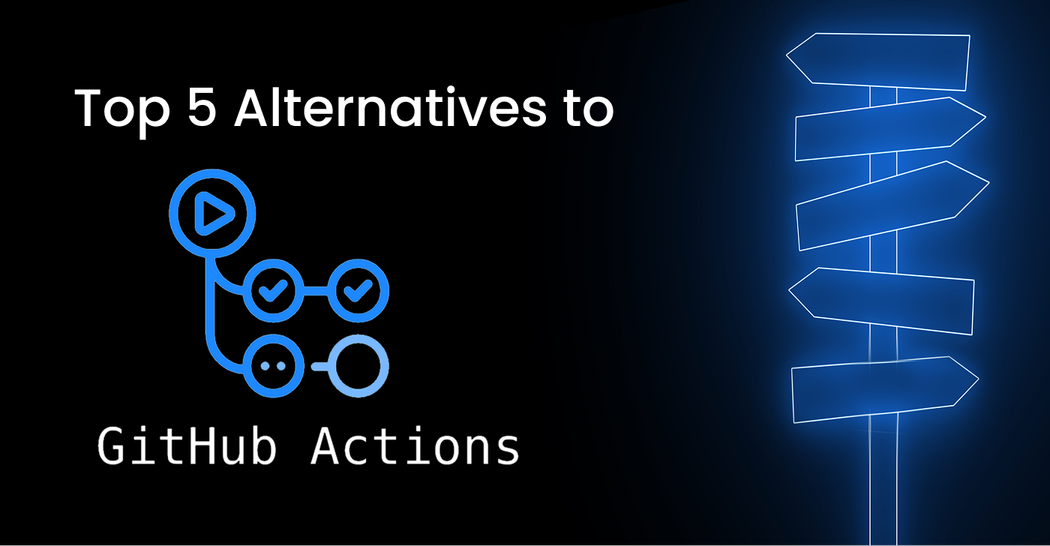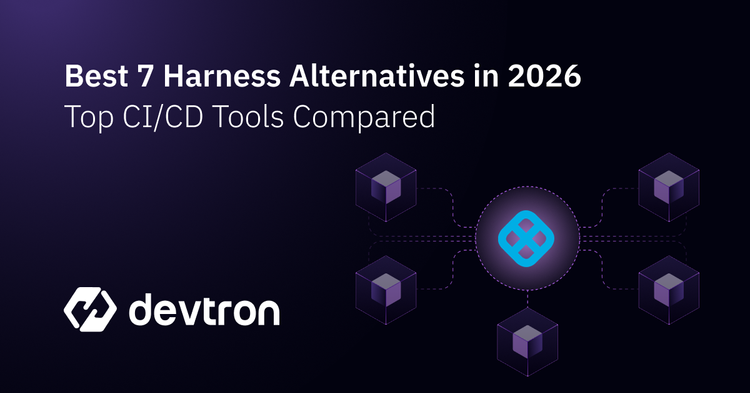GitHub Actions is a powerful integrated CI/CD platform that automates your software development lifecycle directly within GitHub. It enables you to create custom workflows that automatically build, test, and deploy your applications in response to repository events. These workflows can be triggered by various actions such as code pushes, pull requests, issue creation, or scheduled events, streamlining your development process without leaving the GitHub ecosystem.
Why Look for a GitHub Actions Alternative?
GitHub Actions offers seamless integration with GitHub repositories, but organizations often encounter limitations as their deployment needs evolve:
- GitHub-Centric Ecosystem Constraints: Organizations using multiple Git providers or requiring diverse DevOps tool integrations face challenges with GitHub Actions' tightly coupled nature to GitHub's ecosystem
- Limited Kubernetes Orchestration Capabilities: GitHub Actions provides basic Kubernetes support but lacks sophisticated orchestration features for managing complex deployments, handling multi-cluster environments, and implementing advanced deployment strategies
- No Native Support for GitOps: GitHub Actions lacks a robust native GitOps implementation. Teams can integrate third-party tools like Argo CD separately to implement GitOps practices, adding complexity to management and creating potential synchronization issues between systems.
Get in touch for a personalized Demo
Key Evaluation Criteria for CI/CD Tools
When evaluating alternatives to Jenkins, consider these essential criteria to ensure the tool aligns with your organization's needs:
- Cloud-Native Architecture: The tool should be designed to work seamlessly with containerized environments and cloud infrastructure, supporting modern development practices.
- GitOps Support: Support for GitOps is essential, enabling teams to define, manage, and automate application deployments directly from Git repositories, improving consistency and transparency in the delivery process.
- Flexible CI/CD Workflows: The tool should enable developers to customize and adjust their pipelines to meet specific requirements. There should also be enough flexibility to integrate preferred tools into the CI/CD pipelines, allowing them to easily add or remove components without friction.
- Scalability: The ability to handle growing workloads without performance degradation, supporting concurrent builds and deployments.
- Unified Experience: The tool should offer a seamless, unified experience, eliminating the need for teams to switch between multiple tools. This reduces overhead work and minimizes the risk of errors.
- Security and Governance Features: Built-in security capabilities such as secrets management, access controls, and vulnerability scanning to enhance overall application security.
Top 5 GitHub Actions Alternatives in 2025
Devtron
Devtron is an application lifecycle management platform that streamlines the management of cloud-native applications through a single, unified dashboard. Devtron comes with its native GitOps-enabled CI/CD pipelines designed to handle lightning-fast deployments while ensuring strong governance and reliability.
Some of the features that make Devtron the best alternative for other CI/CD tools are:
- Unified Dashboard: Devtron brings both CI and CD together in a central dashboard where you can manage deployments across multiple Kubernetes clusters. This single control point streamlines your workflow by allowing teams to monitor, control, and orchestrate all deployments from one place, eliminating the need to switch between different tools or interfaces.
- Policy-Based Deployments: Devtron lets you connect your preferred security-scanning tools for vulnerability detection and allows you to create custom policies that enforce your compliance requirements.
- Controlled Deployments: Devtron's features, like Deployment Windows, Deployment Approvals, and Lock Configurations, give you greater control over when and how changes are released. These safeguards help prevent potential disruptions in your production environments.
- GitOps-Enabled Pipelines: You are day-1 GitOps enabled, making sure the best practices are followed along for deploying your application without worrying about setting up and managing tools like ArgoCD.
- Flexibility: Devtron CI/CD pipelines offer flexibility in integrating tools of your choice. The pre- and post-build/deployment stages allow you to execute custom tasks before and after the CI and CD processes.
2. GitLab
GitLab offers a comprehensive DevOps platform with built-in CI/CD capabilities, allowing teams to plan, create, verify, package, release, configure, and monitor applications all within a single web interface. In GitLab, CI/CD workflows are defined in the .gitlab-ci.yaml file, from which the automated pipelines are triggered.
Key features of GitLab:
- Integrated DevOps Platform: GitLab offers a comprehensive platform that unifies all stages of the DevOps lifecycle in a single application. This integration eliminates the need to manage multiple tools and reduces context switching for development teams.
- Built-in CI/CD: GitLab's CI/CD capabilities are deeply integrated into the platform, allowing developers to automate building, testing, and deploying their applications. The system uses YAML-based configuration files (gitlab-ci.yml) to define pipelines, making automation setup straightforward and version-controlled.
- Version Control: At its core, GitLab provides robust Git repository management with features extending beyond basic version control.
- Security and Compliance: GitLab integrates security throughout the development lifecycle via its DevSecOps approach. The platform includes built-in static application security testing (SAST), dynamic application security testing (DAST), dependency scanning, container scanning, and license compliance tools.
3. Jenkins
Jenkins is an open-source automation server that enables continuous integration and continuous delivery (CI/CD) through a robust plugin ecosystem. It allows teams to automate building, testing, and deploying software across various environments. In Jenkins, automation workflows are defined using Jenkinsfiles or through the web interface.
Key features of Jenkins:
- Flexible Pipeline Automation Jenkins offers powerful pipeline capabilities through declarative or scripted pipelines defined in Jenkinsfiles. This flexibility enables teams to create complex workflows tailored to specific project requirements.
- Extensive Plugin Ecosystem With thousands of plugins available, Jenkins can integrate with virtually any tool in the development stack. This extensibility allows teams to customize their automation environment to fit their exact needs.
- Build Agent Distribution Jenkins supports distributed builds through its master-agent architecture, enabling workload distribution across multiple machines. This architecture helps teams scale their CI/CD infrastructure efficiently.
- Scheduled Jobs and Triggers Beyond code commits, Jenkins supports various event triggers, including scheduled builds, external webhook events, and dependency-based pipeline initiations.
4. AWS Code Pipeline
AWS CodePipeline is a fully managed continuous delivery service that helps automate release pipelines for fast and reliable application updates. It integrates seamlessly with other AWS services and third-party tools.
Key features of AWS CodePipeline:
- Automated Release Process: AWS CodePipeline provides a fully managed continuous delivery service that automates the build, test, and deployment phases of your release process every time there's a code change. This automation enables rapid and reliable application updates by creating a standardized pipeline for code changes from source to production.
- AWS Integration: CodePipeline seamlessly integrates with other AWS services, creating a cohesive ecosystem for your development workflow. It works natively with services like CodeCommit for source control, CodeBuild for compilation and testing, CodeDeploy for deployment automation, and Lambda for custom processing steps.
- Pipeline History & Status: CodePipeline provides comprehensive visibility into pipeline execution with detailed history tracking and real-time status monitoring. Teams can view the current state of each stage in active pipelines, monitor the progression of code changes, and receive notifications about pipeline events through Amazon SNS or CloudWatch Events.
5. Azure Pipeline
Azure Pipelines provides CI/CD services that work with any language, platform, and cloud. It enables teams to build, test, and deploy to any target, with parallel testing across multiple platforms.
Key features of Azure Pipelines:
- Advanced workflows and features: Azure Pipelines offers sophisticated workflow capabilities, including multi-stage pipelines with approval gates, environment targeting, and deployment strategies. Pipeline tasks can be sequenced in parallel or serial execution depending on dependencies, with capabilities for fan-out/fan-in patterns to optimize processing time.
- Any language, any platform: Azure Pipelines provides extensive support for virtually any programming language, framework, or platform. The service can build, test, and deploy applications written in Java, .NET, Node.js, Python, PHP, Ruby, Go, and many other languages.
- Deploy to any cloud: Azure Pipelines enables deployment to multiple environments and cloud platforms, not just Azure services. The platform includes built-in deployment capabilities for Azure services like App Service and Kubernetes Service (AKS).
- Advanced workflows and features: Azure Pipelines features a robust set of enterprise-ready capabilities, including release gates with automated quality checks, deployment approvals with role-based access control, and detailed audit trails.
Devtron vs GitHub Actions: A Quick Comparison
| Feature | Devtron | GitHub Actions |
|---|---|---|
| Kubernetes Integration | Built specifically for Kubernetes, offering seamless integration and management. | Requires additional configurations and plugins for Kubernetes integration, complicating the process. |
| Deployment Strategies | Provides built-in support for advanced strategies like canary and blue-green deployments. | Lacks native support and requires custom scripting or third-party tools for such strategies. |
| Monitoring & Observability | Offers integrated features for real-time deployment insights and system health monitoring. | Does not include advanced monitoring by default; relies on external tools for full observability. |
| User Experience | Simplified UI focused on Kubernetes workflows, suitable for developers and DevOps teams. | Developer-friendly UI, as it's part of GitHub, a platform well-known to developers. |
| Source Code Management | Integrates with external Git providers (e.g., GitHub, GitLab) for source control. | Comes with built-in Git repository hosting and code management tools. |
Conclusion
In today's rapidly evolving DevOps landscape, organizations are increasingly seeking alternatives to GitHub Actions that offer more specialized functionality, reduced complexity, and improved cloud-native support. The top GitHub Actions alternatives in 2025—Devtron, GitLab, Jenkins, AWS CodePipeline, and Azure Pipelines—each bring unique strengths to address modern CI/CD challenges.
Among these alternatives, Devtron distinctly stands out with its purpose-built Kubernetes integration, unified dashboard, and day-one GitOps enablement, eliminating the need for additional tools like ArgoCD that GitHub Actions requires.
Devtron vs. the Rest: See How We Compare
Making a switch? Discover how Devtron measures up to today’s top DevOps tools.
1. Top 7 Octopus Deploy Alternatives
2. Top 5 Alternatives to Rancher
3. Top 5 Alternatives to GitLab
4. Top 5 Alternatives to Jenkins
5. Top 7 CircleCI Alternatives
6. Top 5 Argo CD Alternatives
7. Top 5 Alternatives to Kubernetes Dashboard
FAQ
Why to look for a GitHub Actions alternative?
To overcome GitHub-centric limitations, lack of native GitOps support, and basic Kubernetes capabilities.
What makes Devtron a strong alternative to GitHub Actions?
Devtron offers built-in GitOps, advanced deployment strategies, and a unified dashboard for Kubernetes-native workflows.
How is GitLab different from GitHub Actions?
GitLab provides an all-in-one DevOps platform with deeply integrated CI/CD and security features.






